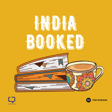
India Booked | Waiting for the Dust to Settle
In this episode of India Booked, host Ayushi Mona talks to Veio Pou, about his brilliant new debut novel, Waiting for the Dust to Settle, published by Speaking Tiger Books. Set in Manipur, the book is a moving novel about the human cost of the violence that the Naga. The podcast discussed what people have endured since the 1980s telling the story of Operation Bluebird—one of the darkest yet little discussed moments in the history of the Indian Army in the northeast. Above everything else, this is a deeply human portrait of an entire people the novel talks about the human cost of the violence that the Naga people have endured since the 1980s. It tells the story of Operation Bluebird—one of the darkest yet little discussed moments in the history of the Indian Army in the northeast. A moving, timely book that is surely to arrest and impress you in the way that Veio intersperses fictional narratives with the stark reality of life. Tune in!
